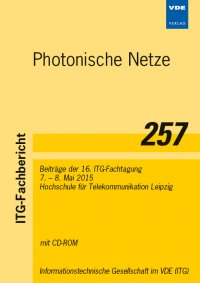Non-linear Mitigation Using Carrier Phase Estimation and K-Means Clustering
Conference: Photonische Netze - 16. ITG-Fachtagung
05/07/2015 - 05/08/2015 at Leipzig, Deutschland
Proceedings: Photonische Netze
Pages: 5Language: englishTyp: PDF
Personal VDE Members are entitled to a 10% discount on this title
Authors:
Pakala, Lalitha; Schmauss, Bernhard (Institute of Microwaves and Photonics (LHFT), Erlangen Graduate School in Advanced Optical Technologies (SAOT) and Graduate Study Group Fiber Optic Transmission and Sensing (FiTS), University of Erlangen-Nuremberg, Cauerstr. 9, 91058 Erlangen, Germany)
Abstract:
We investigate the non-linear mitigation performance of modulation format independent or universal carrier phase estimation (U-CPE) along with K-Means clustering (KMC) algorithm for a 28 Gbaud/s polarization multiplexed (PM) 16 quadrature amplitude modulation (16-QAM) coherent transmission system. Numerical simulations on transmission performance prove that the U-CPE outperforms decision directed carrier phase estimation (DD-CPE) with a gain of 1 dB and non-linear tolerance of approximately 2 dB. Furthermore, it has been verified that a gain of 0.3 dB in both linear and non-linear regimes can be obtained by employing KMC after U-CPE. In addition, the benefit acquired from the combined use of the afore-mentioned algorithms has been also investigated in the presence of laser linewidth effects in addition to fiber non-linearity as well as increasing the feedback delay of U-CPE up to 50 symbol periods to realize the feasibility for real-time implementations. Besides single channel systems, the algorithms have also been employed for wavelength division multiplexing (WDM) systems with 50 GHz channel spacing to see the impact of cross phase modulation (XPM) on their performance. Numerical investigations show that the gain obtained from K-Means algorithm starts vanishing as the XPM effect becomes stronger with an increase in the number of WDM channels.


